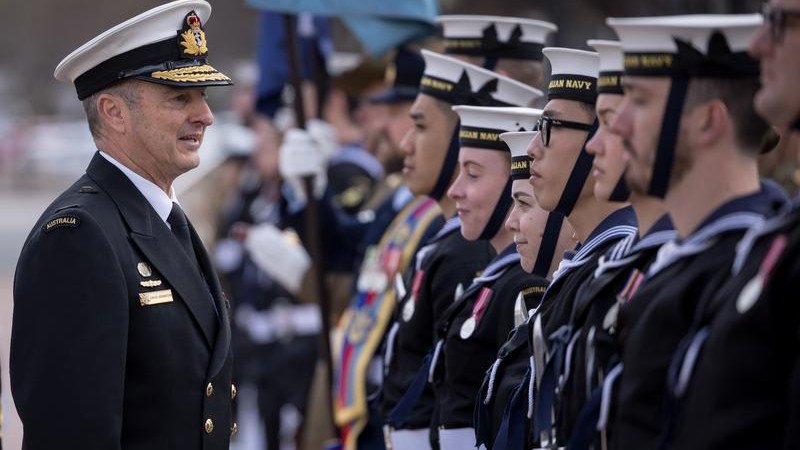Australian Defence Force boss David Johnston promises frank advice on funding needs
Australia’s defence chief has pledged to give ‘frank’ advice to the Government on spending as it comes under increasing pressure to hike the defence budget to deal with growing strategic threats.

Australia’s defence chief on Wednesday pledged to give “frank” advice to the Government on spending as it comes under increasing pressure to hike the defence budget to deal with growing strategic threats.
But Admiral David Johnston sidestepped a direct question at a Canberra forum on whether the nation should significantly boost its defence budget to 3.5 per cent of GDP in the face of US demands to do so.
“Defence is fully expending its budget at the moment,” he said, referring to budget pressures that “we have to make choices on.”
Sign up to The Nightly's newsletters.
Get the first look at the digital newspaper, curated daily stories and breaking headlines delivered to your inbox.
By continuing you agree to our Terms and Privacy Policy.The ADF was currently in the throes of a biennial strategy cycle to review its investment requirements, the head of the Australian Defence Force told a major defence conference hosted by the Australian Strategic Policy Institute.
“(We are) looking at the opportunities or where the investments are required, putting the case to government to increase the defence expenditure where we believe it is needed to meet particular outcomes,” he said.
“That’s where it’s my job … to give government that frank advice and a view of what we need to be doing.”
Earlier in the conference, Admiral Johnston had delivered a sobering warning the nation must face the prospect of conducting combat operations from the homeland, in a radical rethink of its deterrence strategy as the potential for regional conflict looms.
“We’re having to reconsider Australia as a homeland from which we will conduct combat operations,” he said.
Admiral Johnston said this meant a very different approach to national resilience and preparedness, in a period the Government has repeatedly called the most challenging strategic environment since the Second World War.
“We may need to operate and conduct combat operations from this country, and that’s everything from our northern infrastructure, our supply chains, how we integrate with industries states and territories,” he said.
Australia no longer had the “very comfortable security blanket” of a strategic warning time of 10 years, said Admiral Johnston, referring to earlier assessments of the build-up time to conflict.
This “critical judgement” had an inevitable impact on where the ADF chose to make its investments and the necessity to keep pace with rapidly evolving technology, he said.
“Do we fill warehouses with equipment that we think technology will quickly overtake and uncrewed systems countering?” he asked, pointing to the fast-paced evolution of uncrewed systems.
“In Ukraine, the cycle is somewhere up to 12 weeks before tech investments becomes irrelevant because of counter strategy. So, a real consciousness that we need to be very clear about where we make judgments about our technical investment,” he said.
The ADF also had to strike a balance in preparing for complex international strategic challenges and assisting during times of natural disasters, Admiral Johnston said.
“The key for us is, and what the judgment says, we should not be the first responders. So we need to lift the resilience of the community and the organisations that provide that support,” he said.
It was vital for the ADF to have the time be able to focus on developing skills for its international mission, he said, while also recognising the “reassurance” of uniforms on the ground during a time of community need.
Admiral Johnston appeared alongside Vicki Thomson, Chief Executive Officer, GO8 Australia and Joe Buffone, Deputy Coordinator-General, National Emergency Management Agency.
All panellists stressed the need for clear communication to foster crisis resilience and generate confidence rather than fear.
“We talk freely during the lead up to the summer period of all homes should have a bush fire survival approach,” said Admiral Johnston.
“National security is very similar to that, and it’s a responsibility that we have to make sure that understanding of the environment is there, the risks that are emerging and changing in it, and how we as a nation are responding to it,” he said, stressing the need to counter disinformation.

